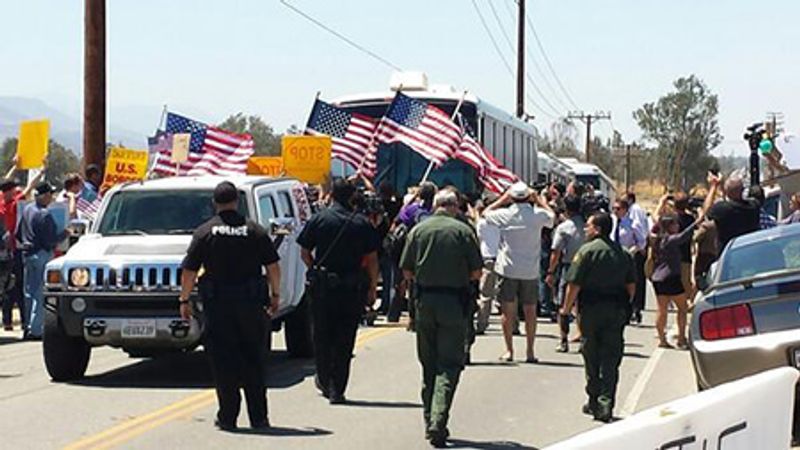Blog
Instead of real immigration reform, we get a border crisis–made in the U.S.A.
On the current immigration issue, President Obama is doing what a politician with no real direction can do: Throw money at the problem.
Asking Congress for $3.7 billion is actually a puny response in a world where $600 billion goes to defense spending.
But it still could end up being a fight anyway. Whether pennies or policy, no one wants to give up an inch–not when it comes to immigration.
When I say the “current immigration” issue, most of us would like to think that phrase might include something resembling the DREAM Act, or some kind of substantive reform on making the undocumented documented.
After all, that is what we’ve all been talking about for years.
Keep dreaming. Any reform is dead for now.
That’s because to pols left and right, solving our immigration problem is like fighting forest fires. Without flames, the trees are just fine. But a hint of flames? It’s crisis mode.
Right now, the flames along the Mexican border are represented by the blazing trail of undocumented children coming into this country–seeking safety.
So far, the Obama Administration response has been more of extreme enforcement mode (as if we need more of that). President Obama indicated his desire to send most of those apprehended back home. If he could only get them into those processing centers in all those welcoming communities (thanks Murrieta, California for turning a story of compassion into a national “not in my backyard’ issue).

There are laws that would make repatriation easy–if the children were from Mexico or Canada.
But these kids are mostly from El Salvador, Honduras, and Guatemala.
Sending these children home without a hearing would require another policy change, and yet another congressional fight.
This drilling down to ethnicity may be the only positive diversity lesson here. Just as people are wrong to think all Asian Americans are Chinese, not every brown child who crosses the Mexican border is Mexican.
And this is where I call on a former colleague of mine, the journalist David Bacon.
At the turn of the century (around 2000), I was the first to produce a “Meet the Press” style show on ethnic and diversity issues. It ran in California on PBS stations. On immigration questions, I’d routinely turn to Bacon.
Bacon points out that the movement of families from these other countries is nothing new and has happened since the ’70s, most notably from El Salvador.
You might even recall the 1983 movie, El Norte, based on Greogry Nava’s journey from Guatamala.
Considering the numbers who left families behind, there had to be time when some would seek reunification with those who went ahead. That seems to be what’s happening now, even though the mainstream media likes to talk almost exclusively of young people fleeing gang violence.
Bacon said while that is a factor, the mass movement of children is still mostly attributable to the failure of their homeland economies to sustain families.
“People are leaving because they can’t survive where they are,” writes Bacon in an article for In These Times.
And, of course, the reason for the failure of these economies can be traced back to the North American and Central American Free Trade Agreements (NAFTA and CAFTA). The policies passed by Congress enabled U.S. corporations to send their products south. The trade agreements wiped out local farmers, but enabled the rise of right-wing governments that have prospered from the arrangement.
Bacon said the repressive governments have also coincided with the growth of gangs that were started by U.S. deportees who’ve been repatriated.
More deportations means more gangs. More gangs lead to more youth attempting to cross borders. Add that to the young people left behind looking for their parents, and no wonder the number of children apprehended at the Mexican border has gone from nearly 4,000 in 2011 to about 40,000 since October 2013.
And the cycle just repeats. And grows.
Americans shouldn’t blame gang violence, repressive governments, or the ethnic families themselves.
Americans in Murietta, California and in Dallas, Texas need only point to their short-sighted representatives in government.
The problem of immigrant children at our borders began with bad decisions on immigration and trade policy–made in the U.S.A. It cries out for a real American response and humanitarian solution, if only there were a sense of compassion that could muster a little political will.

Emil Guillermo is an independent journalist/commentator. Updates at www.amok.com. Follow Emil on Twitter, and like his Facebook page.
The views expressed in his blog do not necessarily represent AALDEF’s views or policies.
Read Emil's full bio →